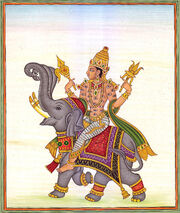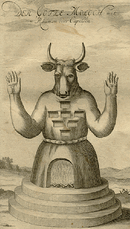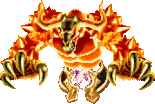mNo edit summary |
No edit summary |
||
| Line 30: | Line 30: | ||
[[wikipedia:Agni|Agni]] is a Hindu and Vedic deity. The word ''agni'' is Sanskrit for "fire" (noun), cognate with Latin ''ignis'' (the root of English "ignite"), Russian ''ogon'' (pronounced ''agon'': "fire"), and ''ogni'' (pronounced ''agni'': "fires"). Agni has three forms: fire, lightning and the sun. |
[[wikipedia:Agni|Agni]] is a Hindu and Vedic deity. The word ''agni'' is Sanskrit for "fire" (noun), cognate with Latin ''ignis'' (the root of English "ignite"), Russian ''ogon'' (pronounced ''agon'': "fire"), and ''ogni'' (pronounced ''agni'': "fires"). Agni has three forms: fire, lightning and the sun. |
||
| + | [[File:Moloch - 01.gif|thumb|130px|<p style="text-align: center;">18th Century depiction of the Moloch idol<br />''Die Alten Jüdischen Heiligthümer'' (1711, 1738)</p>]] |
||
| ⚫ | |||
| + | |||
| ⚫ | |||
His cult survived the change of the ancient Vedic fire worship into modern Hinduism. The sacred fire-drill (agnimathana) for procuring the temple-fire by friction (symbolic of Agni's daily miraculous birth) is still used. |
His cult survived the change of the ancient Vedic fire worship into modern Hinduism. The sacred fire-drill (agnimathana) for procuring the temple-fire by friction (symbolic of Agni's daily miraculous birth) is still used. |
||
| + | |||
| + | However, Aguni's physical appearance in the ''[[Castlevania (series)|Castlevania]]'' series appears to be instead inspired by [[wikipedia:Moloch|Moloch]], the biblical name of a Canaanite god associated with child sacrifice, through fire or war. |
||
==Appearances== |
==Appearances== |
||
Revision as of 17:30, 19 October 2019
- Not to be confused with Agunea.
Aguni is a boss fought in Castlevania: Dawn of Sorrow. He is the embodiment of fire, a primitive god which was captured by Dracula's magic inside an alternate realm which can only by accessed by entering through a mirror. Aguni is the main source of the pyrokinetic powers Dario Bossi controls and must be defeated instead of him to be able to get to the real ending of the game.
Aguni also appears in Castlevania: Portrait of Ruin as an optional boss.
Origins

Agni, the Hindu god of fire.
Agni is a Hindu and Vedic deity. The word agni is Sanskrit for "fire" (noun), cognate with Latin ignis (the root of English "ignite"), Russian ogon (pronounced agon: "fire"), and ogni (pronounced agni: "fires"). Agni has three forms: fire, lightning and the sun.

18th Century depiction of the Moloch idol
Die Alten Jüdischen Heiligthümer (1711, 1738)
Agni is one of the most important of the Vedic gods. He is the god of fire and the acceptor of sacrifices. The sacrifices made to Agni go to the deities because Agni is a messenger from and to the other gods. He is ever-young, because the fire is re-lit every day, yet he's also immortal.
His cult survived the change of the ancient Vedic fire worship into modern Hinduism. The sacred fire-drill (agnimathana) for procuring the temple-fire by friction (symbolic of Agni's daily miraculous birth) is still used.
However, Aguni's physical appearance in the Castlevania series appears to be instead inspired by Moloch, the biblical name of a Canaanite god associated with child sacrifice, through fire or war.
Appearances
Castlevania: Dawn of Sorrow
Aguni first appears in Dawn of Sorrow when Celia Fortner decides that Dario is completely outmatched by Soma Cruz. In order to grant him enough power to defeat Soma, Dario binds his soul with Aguni, and by doing this he greatly increases his pyrokinetic powers. Soma uses the power of Paranoia to enter the mirror behind Dario and destroy Aguni. If the player decides to defeat Dario directly (thus getting the bad ending), then Soma will seal Dario's power with a magic seal, which will cause Aguni to overload Dario and destroy him from within.
Aguni's soul allows Soma to unleash the Aguni Fire, which sends a shockwave of flames in a forward direction on the ground. This soul is very similar to the Frozen Shade's soul, except that Aguni's travels across the ground much faster.
|
Castlevania: Portrait of Ruin
Aguni also appears in Portrait of Ruin as an optional boss found in the coliseum-like secret portrait the Nest of Evil. He fights just like he does in the previous game, although his appearance in this game isn't considered canon.
|
Attacks
- Aguni attempts to swipe at the player with his claws three times in a row. There is enough time between these attacks for Soma to slide away or simply run between them if he is cornered.
- Aguni hovers in midair and spews a series of fireballs which create fountains of fire once they touch the floor and travel across until they reach the edge of the room. These flames can be jumped over and the player may take this opportunity to damage him while he is suspended in midair.
- Aguni flies upward and off the screen, then comes down a moment later and dives into the ground, unleashing two large waves of flames that travel a brief distance across the floor, one on each direction.
- Aguni briefly stops in midair and then makes two to four large swoops across the room in a pendulum-like pattern.
Trivia
- Aguni may be an incorrect translation of the name "Agni", although it could also be a pun on the word "agony".
- Aguni's trademark attack, Aguni Fire, which creates a pillar of fire that travels across the ground, may be the base of Dracula's iconic yet unnamed flame pillars attack (first seen in Castlevania III: Dracula's Curse), as this was a power only the Dark Lord Candidates were able to control (the same way as Dmitrii mastered Dracula's Power of Dominance).
- Other characteristic Dracula's powers (such as Hellfire, Bat Form and Death Touch) were previously given their origins in the prequel Castlevania: Aria of Sorrow.
| Castlevania: Dawn of Sorrow |
|---|
| Characters |
| Protagonists |
| Soma Cruz • Mina Hakuba • Julius Belmont • Yoko Belnades • Genya Arikado (Alucard) • Hammer |
| Antagonists |
| Celia Fortner • Dario Bossi • Dmitrii Blinov • Soma Cruz (Julius Mode) |
| Bosses |
| Flying Armor • Balore • Malphas • Puppet Master • Rahab • Gergoth • Zephyr • Bat Company Paranoia • Aguni • Abaddon • Death • Menace |
| Areas |
| The Lost Village • Wizardry Lab • Garden of Madness • The Dark Chapel • Demon Guest House • Condemned Tower Cursed Clock Tower • Subterranean Hell • Silenced Ruins • The Pinnacle • Mine of Judgment • The Abyss |
| Music |
| Castlevania: Aria of Sorrow & Castlevania: Dawn of Sorrow Original Soundtrack |
| Guides |
| Castlevania: Dawn of Sorrow - The Official Strategy Guide Konami Akumajō Dracula: Sōgetsu no Jūjika Official Guide |
| Archives |
| Bestiary • Inventory • Julius Mode • Voice Translations |

